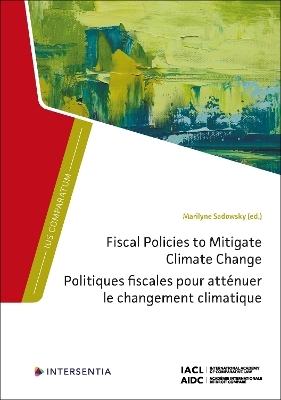
Fiscal Policies to Mitigate Climate Change
Seiten
2023
Intersentia Ltd (Verlag)
978-1-83970-367-6 (ISBN)
Intersentia Ltd (Verlag)
978-1-83970-367-6 (ISBN)
Taxation is a tool for guiding behaviour, which makes it possible to best preserve the environment and the worlds natural resources for future generations. This book shows, based on an analysis of 30 different countries, how taxation can play a decisive role in climate change mitigation.
Taxation can play a fundamental role in climate change mitigation. While all countries have different approaches, they can act together and must do so urgently by prioritizing environmental objectives. In this regard, this is the first time that a book has brought together the climate fiscal policies of 30 countries, including Bhutan, which is currently the only country to be carbon neutral. The analysis of this data reveals a great diversity, which is due to the difficulty of reconciling two distinct objectives - environmental protection and budget preservation - and implementing economic environmental responsibility. Each country is thus setting up a variety of instruments that respond to two different types of logic: compel and/or incentivise. This situation reveals certain weaknesses. These fiscal policies are not coherent and are based on a choice to use revenue for specific purposes, in addition to producing insufficient effects. In this context, some proposals are made to rethink tomorrow's climate fiscal policies.
Taxation can play a fundamental role in climate change mitigation. While all countries have different approaches, they can act together and must do so urgently by prioritizing environmental objectives. In this regard, this is the first time that a book has brought together the climate fiscal policies of 30 countries, including Bhutan, which is currently the only country to be carbon neutral. The analysis of this data reveals a great diversity, which is due to the difficulty of reconciling two distinct objectives - environmental protection and budget preservation - and implementing economic environmental responsibility. Each country is thus setting up a variety of instruments that respond to two different types of logic: compel and/or incentivise. This situation reveals certain weaknesses. These fiscal policies are not coherent and are based on a choice to use revenue for specific purposes, in addition to producing insufficient effects. In this context, some proposals are made to rethink tomorrow's climate fiscal policies.
| Erscheinungsdatum | 04.10.2023 |
|---|---|
| Reihe/Serie | Ius Comparatum |
| Verlagsort | Cambridge |
| Sprache | englisch |
| Maße | 170 x 244 mm |
| Gewicht | 1288 g |
| Themenwelt | Naturwissenschaften ► Biologie ► Ökologie / Naturschutz |
| Recht / Steuern ► EU / Internationales Recht | |
| Recht / Steuern ► Öffentliches Recht ► Umweltrecht | |
| Recht / Steuern ► Steuern / Steuerrecht | |
| ISBN-10 | 1-83970-367-9 / 1839703679 |
| ISBN-13 | 978-1-83970-367-6 / 9781839703676 |
| Zustand | Neuware |
| Informationen gemäß Produktsicherheitsverordnung (GPSR) | |
| Haben Sie eine Frage zum Produkt? |
Mehr entdecken
aus dem Bereich
aus dem Bereich
Grundlagen, Systeme, Anwendung, Wirtschaft
Buch | Hardcover (2024)
Carl Hanser (Verlag)
99,99 €


